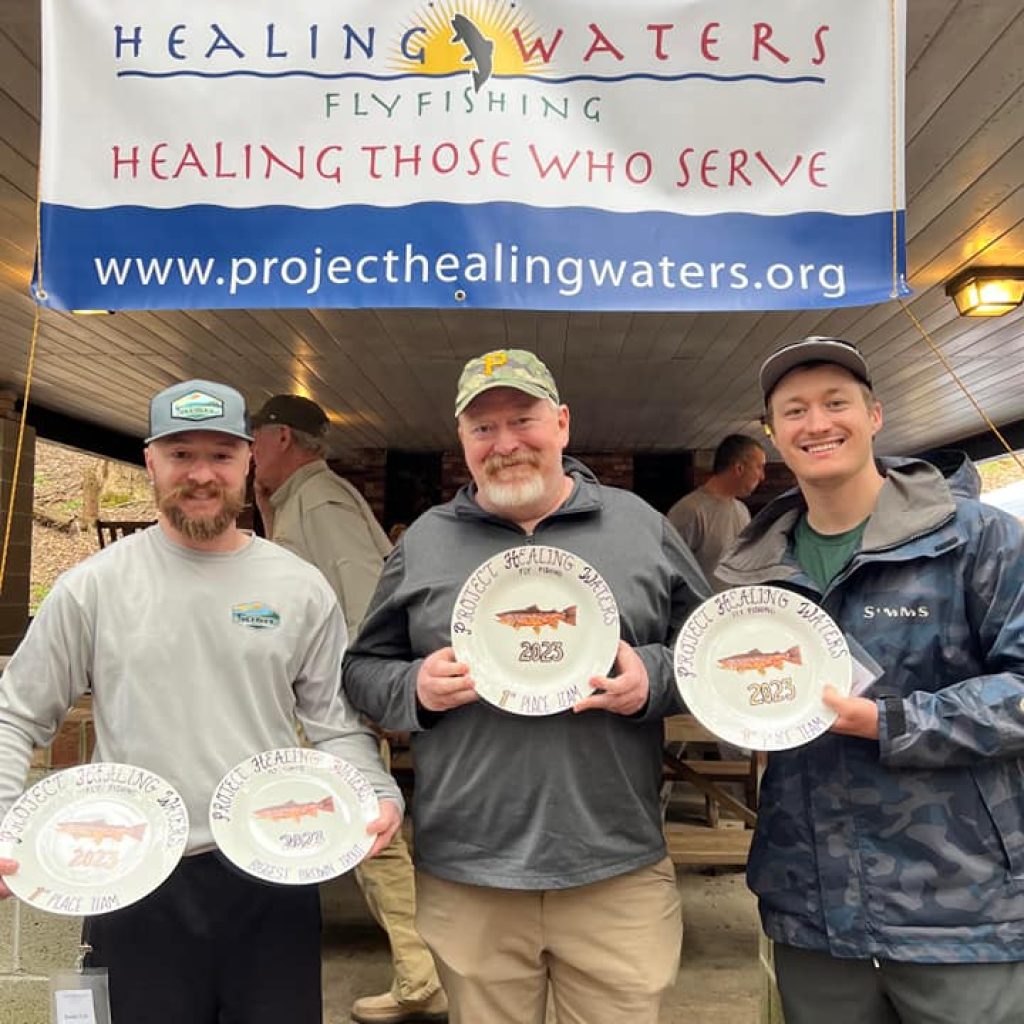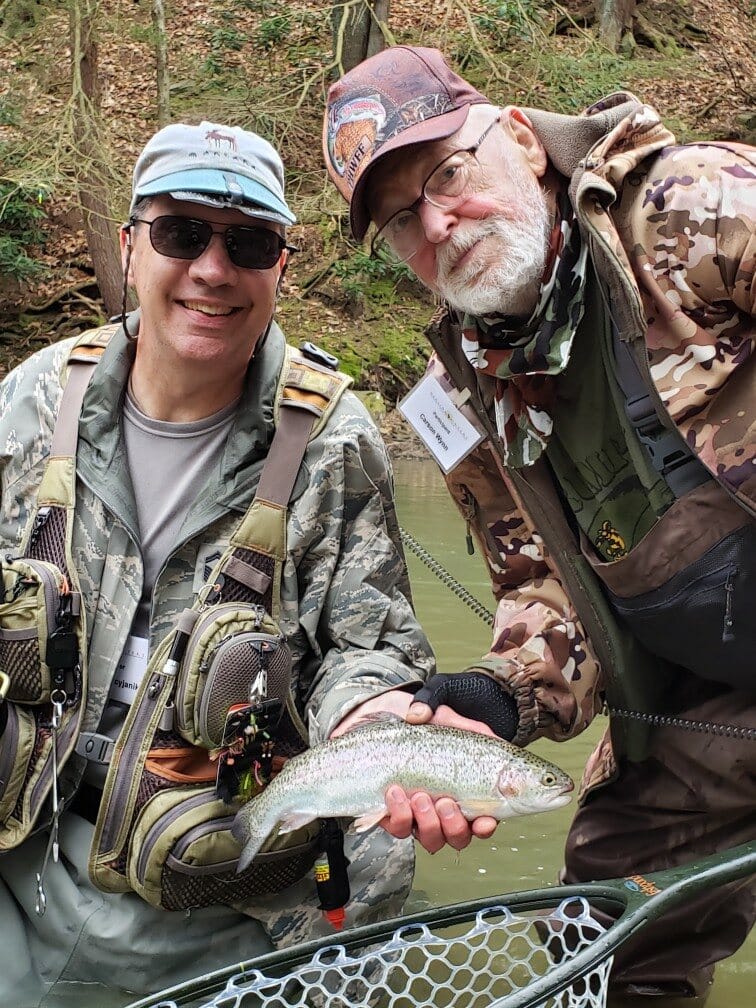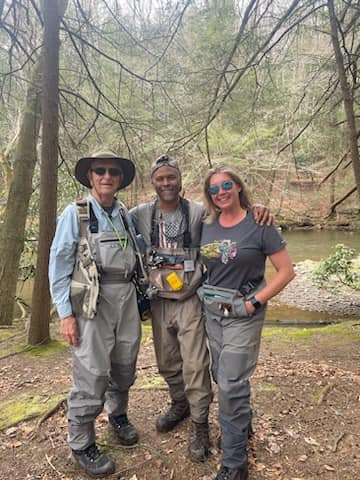NEWS & STORIES
The 5th Annual Project Healing Waters Yellow Creek Tournament
The 5th Annual Project Healing Waters Fly Fishing: Yellow Creek Tournament, hosted by PHW Altoona, PA, was held on April 15th, 2023. Forty anglers paid to come out and be paired up as teammates with 20 PHW Veterans, three to each team, in a day of friendly competition on a private trout stream in the beautiful hills of southwestern PA.
Volunteers began showing up on Friday afternoon to prepare for the following day’s event. Tent canopies were set up, food preparation areas were set up in the pavilion kitchen, wood was prepared for the fire, and “beats” were marked out on the stream bank for the competition. Dave Thomas, PHW Altoona Program Lead, has been coordinating and running the tournament since its inception. Each year, he has tweaked and improved it. It began as a friendly competition of Veterans fishing against non-Veterans. That evolved into pairing the two groups into mixed teams with everybody’s fish counting towards the team total. Last year the “tournament” was forced to be a non-competitive event due to a PA Fish Commission season conflict, so it was a “fish together” opportunity. This year, Thomas found another way to place more emphasis on the veteran aspect of the event. This year only fish caught by the Veteran counted towards the team total for first, second, and third place rankings. Dave explained, “We changed the format so that everybody helps the Veteran more, since these are disabled Veterans. But everybody still gets to fish; one team member is always able to fish while the other is able to focus helping the Veteran as needed.” And everybody got to compete for the largest trout caught of each species.
Some of the Veterans also showed up on Friday afternoon to get a little bit of pre-event fishing in. One of those Veterans, Ron Bernik, was asked about his expectations for the following day: “I’m anticipating the person catching the first fish. It’s like a bunch of kids on Christmas morning!”. He went on to say, “If you catch a fish tomorrow, you’re overjoyed. Some people are great fishermen, but just won’t catch one. None of this is a given.”
Saturday morning began with Veterans and team members showing up an hour before daylight, and then being met with a light rain as dawn broke. After registration, donuts and coffee, followed by a quick rules and safety briefing, the first half of the group was off to the stream to begin the rotating shifts of fishing. The format for the day consisted of half of the teams fishing on ten assigned beats for 45 minutes, while the other half of the teams prepared and spread up and down the stream into their assigned positions. After 45 minutes, the “A” flight moved off of the water and the “B” flight replaced them. This continued all day, with each team also rotating downstream to another beat, or stretch of water, so that nobody fished the same section of water twice to ensure equal chances for everybody. Stationed at each beat was a volunteer controller to measure and record on score sheets all fish caught. These scores were then tallied at the end of the day to determine team winners as well as the largest fish.
Asked about his anticipations for the event during a break during the day, Veteran Charlie Yeager said he expected to catch a few fish, but regardless knew he would have a good time. He mentioned that he got to fish with a person that he knew was struggling with PTSD, got him to start talking, and got him into a few fish. “That’s what was the best for me about this whole thing,” Charlie said.
One of the non-Veteran teammates was Dave Cain. Cain said that while his entire family served in the military, a combination of factors led him instead into the medical field where he is now an Emergency Room Physician’s Assistant. When asked why he came out to fish in a Veteran’s event, he said, “It’s nice to be able to put my skills to use to help in a medical facility, and now to come out and actually help disabled Veterans fish as well”.
Not all of the teammates in the tournament were necessarily non-military. Some were Veterans who chose to pay to fish as team members. One of them was Brian Marcyjanik. He said he came out to fish because something in his world that is seemingly small may be everything in somebody else’s world, and he loves to share that opportunity and make a difference when he can. He stated, “I get a lot of fun out of interaction with a purpose. It’s especially enjoyable walking to the water with a Veteran and seeing something like flipping a switch in them. I still can’t pin down the exact feeling, but I have this overwhelming desire to help others who are genuinely struggling, along with keeping that help very simple and to the point. I’ve seen very dramatic results that I can’t explain given the level of input and assistance I’ve offered. There’s some sort of synergy at work that logic won’t begin to capture”.
A major part of Project Healing Waters, and events like this, is exactly that. It is interaction, it is getting Veterans together, it is getting Veterans with non-Veterans. During lunch, Veteran Mike Yauneridge expressed, “Project Healing Waters gets me out doing stuff. It gets me out here fishing with these guys. It gets me tying flies. It gets me building rods. It gets my mind off other things for a while.” Another Veteran, Dan McIntyre, mentioned how much he enjoys looking forward to class and relaxing with other veterans. Fellow Veteran Ron Marsh echoed, “A team didn’t show up, so they put three of us Veterans together at the last minute to fill in as a team. We all talked about what we did in the service. You can’t always do that somewhere else. So what I’m doing today is actually helping other Veterans while we fish”. Kathy Thomas, who helped to run the kitchen, commented, “I talked to a Veteran who never fly fished before. He was part of a group in the service. Now he’s part of a group again now that he’s out.”
Throughout the day, fish continued to be caught, measured, and released. The score board was updated, and teams constantly checked it between their turns fishing. Lots of good-natured ribbing took place, especially amongst the teams near the bottom. Few were concerned about the comments being made as everybody knew that the word “tournament” was in title only, and comments only encouraged more in return. One of the team members that was experiencing his first exposure to a PHW event like this was Doug Williams. “I couldn’t have appreciated the great camaraderie and bonding before I got here,” he said. “I really appreciate what this organization stands for and consider it a privilege to be fishing here with these guys.”
On the theme of teammates helping the Veteran that they were fishing with, Williams noted that he was fishing with a Vietnam Veteran with mobility issues. “We were both very cautious for him. He expressed some balance issues to us. We helped him into and out of the stream, and one of us was always near him. We were very protective. Then we got to talk a lot between beats.” Others that talked between beats were team member Wyatt Kosicki and his Veteran. When asked if his Veteran revealed anything surprising about himself, Kosicki remarked, “I was shocked to hear about some of his military injuries. I never would’ve guessed. You just can’t take things for granted I guess.” That observation ties in well with PHW’s mission of helping Veterans dealing with a wide range of both emotional and physical disabilities.
Some Veterans in PHW were so moved and inspired by their experiences at prior gatherings that they went on to create their own nonprofit organizations helping Veterans. One of them at this event was Ed Transue. When asked how PHW benefitted him personally, Transue replied, “I get to make a difference in people’s lives now”. He went on to note that the often-quoted statistic of 22 veteran suicides per day is now up to 32 suicides per day. “If I can take somebody away from where I was, I know I’m doing something good. Project Healing Waters got me there.”
At the end of the afternoon, scores were tallied, awards were handed out, and dinner was served. Looking back at the day’s event, Cain reflected, “It was nice to see how close everybody gets in a short time, and watch relationships form. You don’t see a single person upset, even the people that got skunked; there’s just a general happiness. When the biggest fish gets caught here everybody gets excited, everywhere else they’re jealous.”
Marsh looked at the day and compared it to his days in Vietnam: “That was a bad movie, and I never have to go back and see it again. Now I just go enjoy my time fishing and being with fellow Veterans.”
Project Healing Waters’ stated mission is its dedication to the physical and emotional rehabilitation of disabled veterans through fly fishing and associated activities including education and outings. Days like this go a long way towards that rehabilitation. For more information on the local Programs involved with this event, visit www.facebook.com/PHWFFAltoonaPA and www.facebook.com/PHWFFPittsburgh.
Latest News
- “There’s A Peace You Have Being Out Here.”
- Pennsylvania Veterans Healing Through Fly Fishing
- The Project Healing Waters Spotlight: Marilyn Rogan – Volunteer
- The Project Healing Waters Spotlight: Paul Bohorquez – U.S. Marine Corps Veteran
- Project Healing Waters Tennessee Valley In The News: National Casting Champion Earns The Spotlight!


